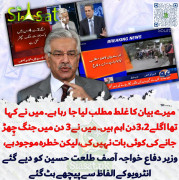Does that mean you do not pray in the manner/time that Muslims do?The Quran does not have the details of the Namaz because the Namaz was not ordained in the Quran.
You are using an out of date browser. It may not display this or other websites correctly.
You should upgrade or use an alternative browser.
You should upgrade or use an alternative browser.
The Quran's Stance on Hadiths
- Thread starter Citizen X
- Start date
Wake up Pak
(50k+ posts) بابائے فورم
Yes, I do not, but I used to.Does that mean you do not pray in the manner/time that Muslims do?
Wake up Pak
(50k+ posts) بابائے فورم
https://twitter.com/x/status/1716031260299001856Does that mean you do not pray in the manner/time that Muslims do?
So under your methodology what is your understanding on the verses that talk about Salah? Can you give them any context other than just taking the dictionary/linguistic translation of the word.Yes, I do not, but I used to.
Wake up Pak
(50k+ posts) بابائے فورم
Salat does not mean Namaz. Salat is to connect, follow, etc.So under your methodology what is your understanding on the verses that talk about Salah? Can you give them any context other than just taking the dictionary/linguistic translation of the word.
If Allah wanted us to perform "Namaz" He would have given us the details of it.
Okay so you follow the dictionary/lexicon approach to understanding the Qur'an.Salat does not mean Namaz. Salat is to connect, follow, etc.
If Allah wanted us to perform "Namaz" He would have given us the details of it.
So to the methodology you and your group is to take every mention of Salah as to mean connect/follow - how is that done?
Kindly share how you practice the following verses :
2:43 And establish prayer and give zakah and bow with those who bow [in worship and obedience].
2:238 Maintain with care the [obligatory] prayers and [in particular] the middle prayer and stand before Allah, devoutly obedient
4:101 And when you travel throughout the land, there is no blame upon you for shortening the prayer, [especially] if you fear that those who disbelieve may disrupt [or attack] you. Indeed, the disbelievers are ever to you a clear enemy.
4:102 And when you are among them and lead them in prayer, let a group of them stand [in prayer] with you and let them carry their arms. And when they have prostrated, let them be [in position] behind you and have the other group come forward which has not [yet] prayed and let them pray with you, taking precaution and carrying their arms.
4:103 And when you have completed the prayer, remember Allah standing, sitting, or [lying] on your sides. But when you become secure, re-establish [regular] prayer. Indeed, prayer has been decreed upon the believers a decree of specified times.
4:142-143 Indeed, the hypocrites [think to] deceive Allah, but He is deceiving them. And when they stand for prayer, they stand lazily, showing [themselves to] the people and not remembering Allah except a little, Wavering between them, [belonging] neither to the believers nor to the disbelievers. And whoever Allah leaves astray – never will you find for him a way.
5:6 O you who have believed, when you rise to [perform] prayer, wash your faces and your forearms to the elbows and wipe over your heads and wash your feet to the ankles. And if you are in a state of janabah, then purify yourselves.
(24:37) people whom neither commerce nor striving after profit diverts them from remembering Allah, from establishing Prayer, and from paying Zakah;
19:59-60 But there came after them successors who neglected prayer and pursued desires;
Wake up Pak
(50k+ posts) بابائے فورم
Just plug in to connect, to follow instead of salat, and you will have the answers.Okay so you follow the dictionary/lexicon approach to understanding the Qur'an.
So to the methodology you and your group is to take every mention of Salah as to mean connect/follow - how is that done?
Kindly share how you practice the following verses :
2:43 And establish prayer and give zakah and bow with those who bow [in worship and obedience].
2:238 Maintain with care the [obligatory] prayers and [in particular] the middle prayer and stand before Allah, devoutly obedient
4:101 And when you travel throughout the land, there is no blame upon you for shortening the prayer, [especially] if you fear that those who disbelieve may disrupt [or attack] you. Indeed, the disbelievers are ever to you a clear enemy.
4:102 And when you are among them and lead them in prayer, let a group of them stand [in prayer] with you and let them carry their arms. And when they have prostrated, let them be [in position] behind you and have the other group come forward which has not [yet] prayed and let them pray with you, taking precaution and carrying their arms.
4:103 And when you have completed the prayer, remember Allah standing, sitting, or [lying] on your sides. But when you become secure, re-establish [regular] prayer. Indeed, prayer has been decreed upon the believers a decree of specified times.
4:142-143 Indeed, the hypocrites [think to] deceive Allah, but He is deceiving them. And when they stand for prayer, they stand lazily, showing [themselves to] the people and not remembering Allah except a little, Wavering between them, [belonging] neither to the believers nor to the disbelievers. And whoever Allah leaves astray – never will you find for him a way.
5:6 O you who have believed, when you rise to [perform] prayer, wash your faces and your forearms to the elbows and wipe over your heads and wash your feet to the ankles. And if you are in a state of janabah, then purify yourselves.
(24:37) people whom neither commerce nor striving after profit diverts them from remembering Allah, from establishing Prayer, and from paying Zakah;
19:59-60 But there came after them successors who neglected prayer and pursued desires;
If you think these verses are talking about the Namaz, then provide the detail on how to perform Namaz it in detail.
Do you bow when you connect and follow? Do you stand? Do you wash?.Just plug in to connect, to follow instead of salat, and you will have the answers.
And again how exactly do you establish and perform Salah/connect/follow. When do you stand and when do you bow and when do you prostrate?
Do you do it at the times mentioned?
In the following verses about the day of Friday, when do you do when the nida / call for connect/Salah/follow is made, how do you make it who makes it?
Where you do proceed to and disperse from?
62:9 O you who have believed, when [the adhan] is called for the prayer on the day of Jumu’ah [Friday], then proceed to the remembrance of Allah and leave trade. That is better for you, if you only knew.
62:10 And when the prayer has been concluded, disperse within the land and seek from the bounty of Allah, and remember Allah often that you may succeed.
And finally this verse :
107:4-6 So, Woe to those performers of Salah, [But] who are heedless of their prayer – Those who make show.
What is being done so we know what exactly is being done to show off?
Wake up Pak
(50k+ posts) بابائے فورم
I have discussed this issue multiple times. To clarify, can you please explain the meaning of Salat in the Quran?Do you bow when you connect and follow? Do you stand? Do you wash?.
And again how exactly do you establish and perform Salah/connect/follow. When do you stand and when do you bow and when do you prostrate?
Do you do it at the times mentioned?
In the following verses about the day of Friday, when do you do when the nida / call for connect/Salah/follow is made, how do you make it who makes it?
Where you do proceed to and disperse from?
62:9 O you who have believed, when [the adhan] is called for the prayer on the day of Jumu’ah [Friday], then proceed to the remembrance of Allah and leave trade. That is better for you, if you only knew.
62:10 And when the prayer has been concluded, disperse within the land and seek from the bounty of Allah, and remember Allah often that you may succeed.
And finally this verse :
107:4-6 So, Woe to those performers of Salah, [But] who are heedless of their prayer – Those who make show.
What is being done so we know what exactly is being done to show off?
Could you point to me your thread/posts please.I have discussed this issue multiple times. To clarify, can you please explain the meaning of Salat in the Quran?
Yes I can by using scholarly and historic works that cite actions and words of the Prophet Muhammad pbuh and early generations.
I know you totally reject this way of giving context to the Qur'an right? But are content with taking a dictionary to understand it right?
Wake up Pak
(50k+ posts) بابائے فورم
You may want to search the Islamic Corner. Could you provide details of Namaz from the Quran?Could you point to me your thread/posts please.
Yes I can by using scholarly and historic works that cite actions and words of the Prophet Muhammad pbuh and early generations.
I know you totally reject this way of giving context to the Qur'an right? But are content with taking a dictionary to understand it right?
The Arabic is Salah - and no aside from mentions of certains parts of the ritual act and times for it to be done, the description is from historical narrations.You may want to search the Islamic Corner. Could you provide details of Namaz from the Quran?
Wake up Pak
(50k+ posts) بابائے فورم
Even historical narrations (Ahadith) will not tell you the exact method of Namaz.The Arabic is Salah - and no aside from mentions of certains parts of the ritual act and times for it to be done, the description is from historical narrations.
That's fine, but how do you practise those verses? I can't view your profile to search your posts.Even historical narrations (Ahadith) will not tell you the exact method of Namaz.
Wake up Pak
(50k+ posts) بابائے فورم
How I practice those verses is not the issue. It is you who needs to clarify since you are associating those verses with the Namaz.That's fine, but how do you practise those verses? I can't view your profile to search your posts.
I am enquiring your methodology hence I asked.How I practice those verses is not the issue. It is you who needs to clarify since you are associating those verses with the Namaz.
I don't need to clarify because you already know my beliefs that the hadith further expand on some verses - there are books from the past 1,000 odd years on the subject. I'm not trying to defend my position as you already disbelieve in the concept of using hadith or anything external to understand the Qur'an.
So you don't pray Salah as the Muslims have done over the past 1400 years, so then what do you do to enact the 'salah' mentioned in the Qur'an and how does it incorporate what the Qur'an mentions about the Salah.
Wake up Pak
(50k+ posts) بابائے فورم
As I previously stated, since I do not practice Namza and you do, it is up to you to explain where you learned to perform the Namaz, as it is not mentioned in the Quran.I am enquiring your methodology hence I asked.
I don't need to clarify because you already know my beliefs that the hadith further expand on some verses - there are books from the past 1,000 odd years on the subject. I'm not trying to defend my position as you already disbelieve in the concept of using hadith or anything external to understand the Qur'an.
So you don't pray Salah as the Muslims have done over the past 1400 years, so then what do you do to enact the 'salah' mentioned in the Qur'an and how does it incorporate what the Qur'an mentions about the Salah.
I'm not sure if you're taking the piss or not.As I previously stated, since I do not practice Namza and you do, it is up to you to explain where you learned to perform the Namaz, as it is not mentioned in the Quran.
You do know the prayer that the Pakistanis and few others refer to as Namaz is referred to as Salah by the Muslims Arabs right?
There is a linguistic definition of a word and a Shari' definition of a word.
Example being just the use of the word Islam - it means submission but when we use it we know we are using it to refer to the Deen al Islam, so not every submitter to something is actually practising the Deen.
You seem not to want to answer the questions and want to ask me to answer something I already have and you know.
So you do not perform the Shari' prayer (consensus of all the classical scholars) at all and reject the very notion of it.
What do you actually practise? Do you fast, do hajj, give zakah? Do you believe in the concept of Heaven and He'll, and that the believers go to one and the disbelievers to the other etc?
From all the posts I have seen from you - there is no actually grounding or methodology you follow - just hide behind I follow the Qur'an only which has led to you not believing in the Salah (prayer).
Wake up Pak
(50k+ posts) بابائے فورم
Oh, really? Please let me know where you responded with specifics on how to do Namaz.You seem not to want to answer the questions and want to ask me to answer something I already have and you know.
Wake up Pak
(50k+ posts) بابائے فورم
Stick to the Namaz now, as you are already deficient in giving the details of Namaz.What do you actually practise? Do you fast, do hajj, give zakah? Do you believe in the concept of Heaven and He'll, and that the believers go to one and the disbelievers to the other etc?
© Copyrights 2008 - 2025 Siasat.pk - All Rights Reserved. Privacy Policy | Disclaimer|





























